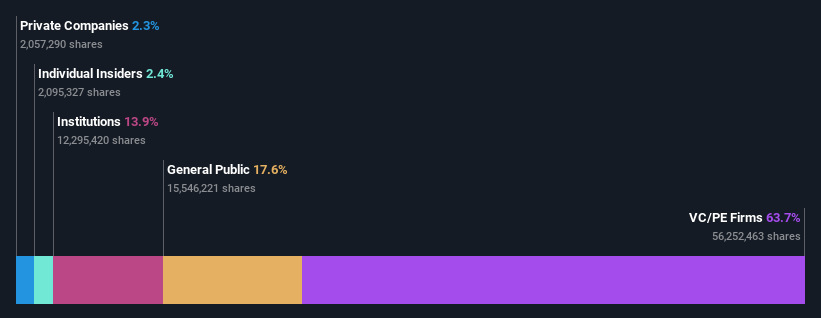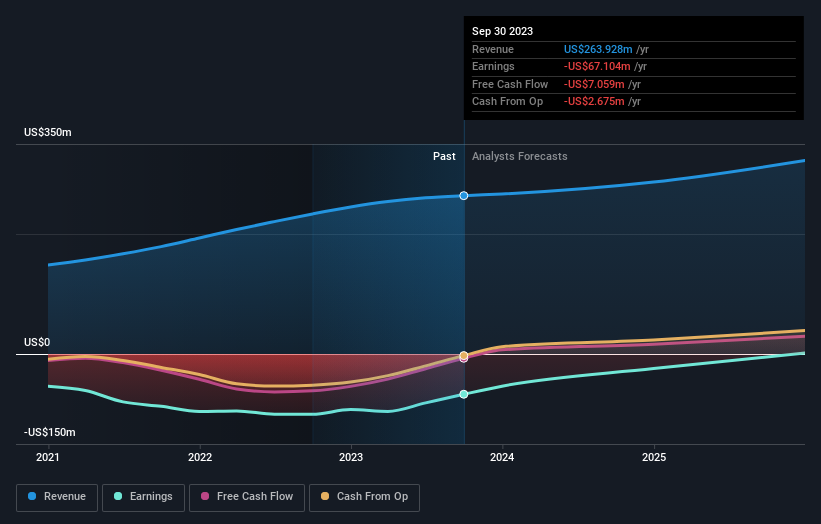While individual investors own 18% of WalkMe Ltd. (NASDAQ:WKME), private equity firms are its largest shareholders with 64% ownership
Key Insights
Significant control over WalkMe by private equity firms implies that the general public has more power to influence management and governance-related decisions
A total of 4 investors have a majority stake in the company with 57% ownership
Every investor in WalkMe Ltd. (NASDAQ:WKME) should be aware of the most powerful shareholder groups. We can see that private equity firms own the lion's share in the company with 64% ownership. Put another way, the group faces the maximum upside potential (or downside risk).
Individual investors, on the other hand, account for 18% of the company's stockholders.
Let's delve deeper into each type of owner of WalkMe, beginning with the chart below.
See our latest analysis for WalkMe
What Does The Institutional Ownership Tell Us About WalkMe?
Institutional investors commonly compare their own returns to the returns of a commonly followed index. So they generally do consider buying larger companies that are included in the relevant benchmark index.
WalkMe already has institutions on the share registry. Indeed, they own a respectable stake in the company. This suggests some credibility amongst professional investors. But we can't rely on that fact alone since institutions make bad investments sometimes, just like everyone does. It is not uncommon to see a big share price drop if two large institutional investors try to sell out of a stock at the same time. So it is worth checking the past earnings trajectory of WalkMe, (below). Of course, keep in mind that there are other factors to consider, too.
WalkMe is not owned by hedge funds. Insight Venture Management, LLC is currently the largest shareholder, with 27% of shares outstanding. Meanwhile, the second and third largest shareholders, hold 12% and 11%, of the shares outstanding, respectively. In addition, we found that Dan Adika, the CEO has 0.7% of the shares allocated to their name.
On looking further, we found that 57% of the shares are owned by the top 4 shareholders. In other words, these shareholders have a meaningful say in the decisions of the company.
While it makes sense to study institutional ownership data for a company, it also makes sense to study analyst sentiments to know which way the wind is blowing. There are plenty of analysts covering the stock, so it might be worth seeing what they are forecasting, too.
Insider Ownership Of WalkMe
The definition of company insiders can be subjective and does vary between jurisdictions. Our data reflects individual insiders, capturing board members at the very least. The company management answer to the board and the latter should represent the interests of shareholders. Notably, sometimes top-level managers are on the board themselves.
Insider ownership is positive when it signals leadership are thinking like the true owners of the company. However, high insider ownership can also give immense power to a small group within the company. This can be negative in some circumstances.
Shareholders would probably be interested to learn that insiders own shares in WalkMe Ltd.. In their own names, insiders own US$20m worth of stock in the US$830m company. It is good to see some investment by insiders, but it might be worth checking if those insiders have been buying.
General Public Ownership
With a 18% ownership, the general public, mostly comprising of individual investors, have some degree of sway over WalkMe. This size of ownership, while considerable, may not be enough to change company policy if the decision is not in sync with other large shareholders.
Private Equity Ownership
With a stake of 64%, private equity firms could influence the WalkMe board. Some might like this, because private equity are sometimes activists who hold management accountable. But other times, private equity is selling out, having taking the company public.
Next Steps:
While it is well worth considering the different groups that own a company, there are other factors that are even more important. For instance, we've identified 2 warning signs for WalkMe that you should be aware of.
But ultimately it is the future, not the past, that will determine how well the owners of this business will do. Therefore we think it advisable to take a look at this free report showing whether analysts are predicting a brighter future.
NB: Figures in this article are calculated using data from the last twelve months, which refer to the 12-month period ending on the last date of the month the financial statement is dated. This may not be consistent with full year annual report figures.
Have feedback on this article? Concerned about the content? Get in touch with us directly. Alternatively, email editorial-team (at) simplywallst.com.
This article by Simply Wall St is general in nature. We provide commentary based on historical data and analyst forecasts only using an unbiased methodology and our articles are not intended to be financial advice. It does not constitute a recommendation to buy or sell any stock, and does not take account of your objectives, or your financial situation. We aim to bring you long-term focused analysis driven by fundamental data. Note that our analysis may not factor in the latest price-sensitive company announcements or qualitative material. Simply Wall St has no position in any stocks mentioned.

 Yahoo Finance
Yahoo Finance 

